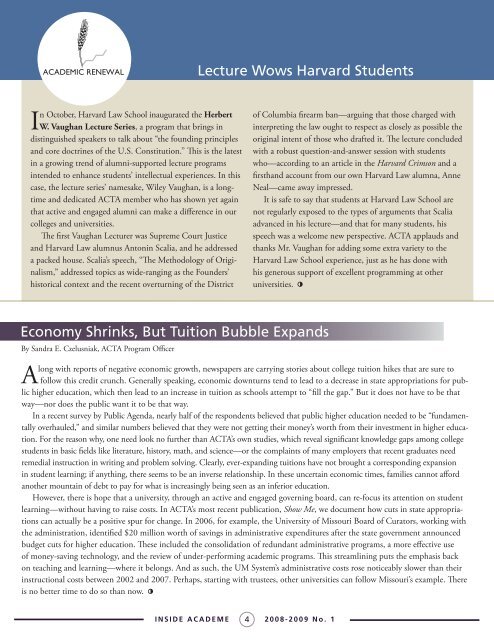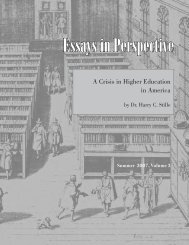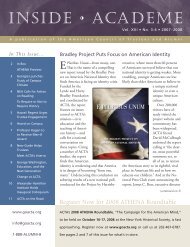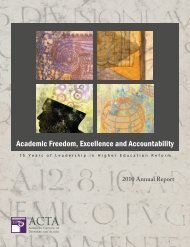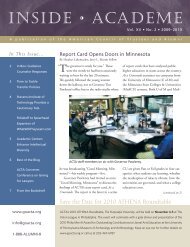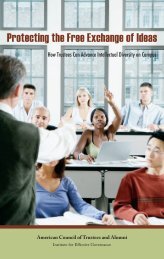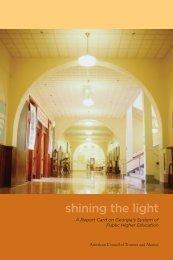Inside • Academe - The American Council of Trustees and Alumni
Inside • Academe - The American Council of Trustees and Alumni
Inside • Academe - The American Council of Trustees and Alumni
Create successful ePaper yourself
Turn your PDF publications into a flip-book with our unique Google optimized e-Paper software.
Lecture Wows Harvard Students<br />
In October, Harvard Law School inaugurated the Herbert<br />
W. Vaughan Lecture Series, a program that brings in<br />
distinguished speakers to talk about “the founding principles<br />
<strong>and</strong> core doctrines <strong>of</strong> the U.S. Constitution.” This is the latest<br />
in a growing trend <strong>of</strong> alumni-supported lecture programs<br />
intended to enhance students’ intellectual experiences. In this<br />
case, the lecture series’ namesake, Wiley Vaughan, is a longtime<br />
<strong>and</strong> dedicated ACTA member who has shown yet again<br />
that active <strong>and</strong> engaged alumni can make a difference in our<br />
colleges <strong>and</strong> universities.<br />
<strong>The</strong> first Vaughan Lecturer was Supreme Court Justice<br />
<strong>and</strong> Harvard Law alumnus Antonin Scalia, <strong>and</strong> he addressed<br />
a packed house. Scalia’s speech, “<strong>The</strong> Methodology <strong>of</strong> Originalism,”<br />
addressed topics as wide-ranging as the Founders’<br />
historical context <strong>and</strong> the recent overturning <strong>of</strong> the District<br />
Philanthropists Discuss Higher Education<br />
<strong>of</strong> Columbia firearm ban—arguing that those charged with<br />
interpreting the law ought to respect as closely as possible the<br />
original intent <strong>of</strong> those who drafted it. <strong>The</strong> lecture concluded<br />
with a robust question-<strong>and</strong>-answer session with students<br />
who—according to an article in the Harvard Crimson <strong>and</strong> a<br />
firsth<strong>and</strong> account from our own Harvard Law alumna, Anne<br />
Neal—came away impressed.<br />
It is safe to say that students at Harvard Law School are<br />
not regularly exposed to the types <strong>of</strong> arguments that Scalia<br />
advanced in his lecture—<strong>and</strong> that for many students, his<br />
speech was a welcome new perspective. ACTA applauds <strong>and</strong><br />
thanks Mr. Vaughan for adding some extra variety to the<br />
Harvard Law School experience, just as he has done with<br />
his generous support <strong>of</strong> excellent programming at other<br />
universities.<br />
<strong>•</strong><br />
Economy Shrinks, But Tuition Bubble Exp<strong>and</strong>s<br />
By S<strong>and</strong>ra E. Czelusniak, ACTA Program Officer<br />
Along with reports <strong>of</strong> negative economic growth, newspapers are carrying stories about college tuition hikes that are sure to<br />
follow this credit crunch. Generally speaking, economic downturns tend to lead to a decrease in state appropriations for public<br />
higher education, which then lead to an increase in tuition as schools attempt to “fill the gap.” But it does not have to be that<br />
way—nor does the public want it to be that way.<br />
In a recent survey by Public Agenda, nearly half <strong>of</strong> the respondents believed that public higher education needed to be “fundamentally<br />
overhauled,” <strong>and</strong> similar numbers believed that they were not getting their money’s worth from their investment in higher education.<br />
For the reason why, one need look no further than ACTA’s own studies, which reveal significant knowledge gaps among college<br />
students in basic fields like literature, history, math, <strong>and</strong> science—or the complaints <strong>of</strong> many employers that recent graduates need<br />
remedial instruction in writing <strong>and</strong> problem solving. Clearly, ever-exp<strong>and</strong>ing tuitions have not brought a corresponding expansion<br />
in student learning; if anything, there seems to be an inverse relationship. In these uncertain economic times, families cannot afford<br />
another mountain <strong>of</strong> debt to pay for what is increasingly being seen as an inferior education.<br />
However, there is hope that a university, through an active <strong>and</strong> engaged governing board, can re-focus its attention on student<br />
learning—without having to raise costs. In ACTA’s most recent publication, Show Me, we document how cuts in state appropriations<br />
can actually be a positive spur for change. In 2006, for example, the University <strong>of</strong> Missouri Board <strong>of</strong> Curators, working with<br />
the administration, identified $20 million worth <strong>of</strong> savings in administrative expenditures after the state government announced<br />
budget cuts for higher education. <strong>The</strong>se included the consolidation <strong>of</strong> redundant administrative programs, a more effective use<br />
<strong>of</strong> money-saving technology, <strong>and</strong> the review <strong>of</strong> under-performing academic programs. This streamlining puts the emphasis back<br />
on teaching <strong>and</strong> learning—where it belongs. And as such, the UM System’s administrative costs rose noticeably slower than their<br />
instructional costs between 2002 <strong>and</strong> 2007. Perhaps, starting with trustees, other universities can follow Missouri’s example. <strong>The</strong>re<br />
is no better time to do so than now.<br />
<strong>•</strong><br />
INSIDE ACADEME 4 2008-2009 No. 1


